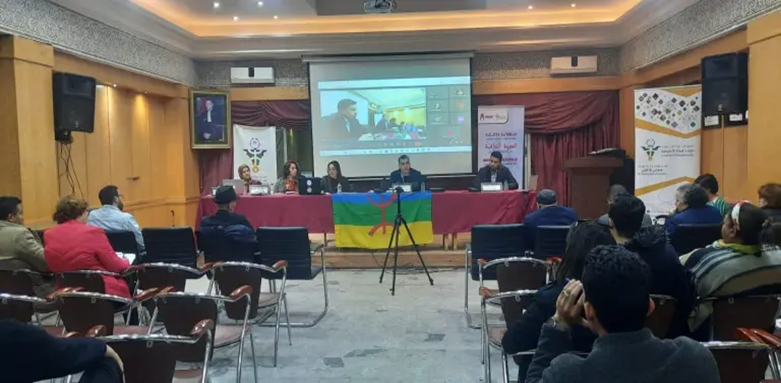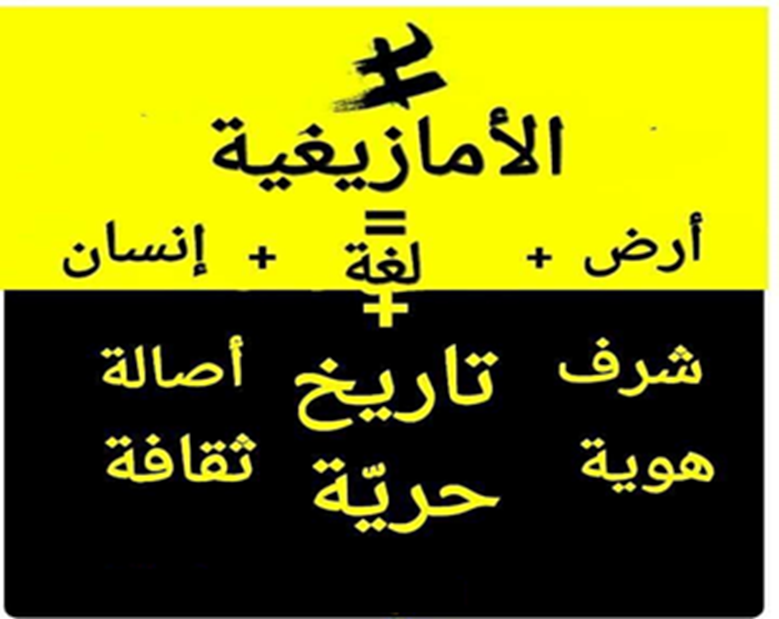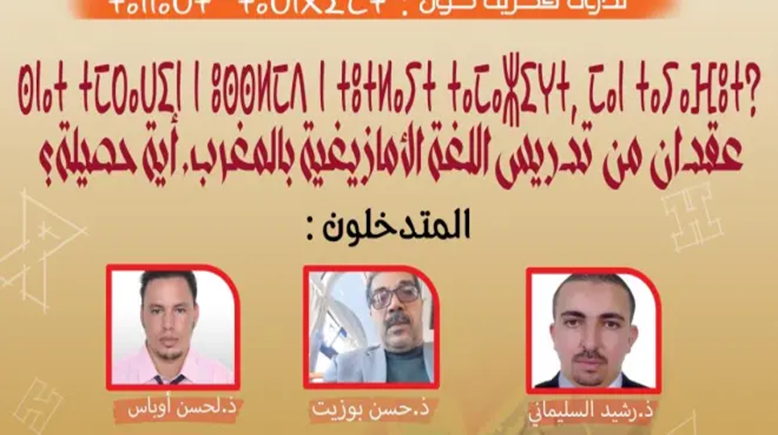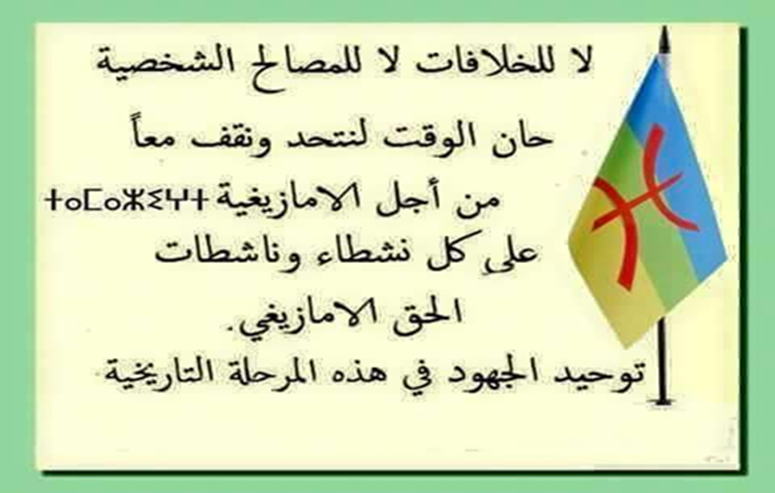Researchers reveal the status of the Amazigh language in aspects of life in Morocco and the countries of Tamazgha

On March 4, the “Amazigh Women’s Voice Association” celebrated in Rabat the International Day of Mother Languages and the International Decade of Indigenous Languages, by organizing a symposium under the slogan: “Amazigh between legal dedication and the opposite reality,” in which a group of professors, researchers, and actors in various fields contributed.
In this symposium, the “Voice of the Amazigh Woman” shed light on the reality of the Amazigh language in Morocco and its status in public life, and the participants, in the same symposium, also stood on some of the constraints that still limit the Amazigh language from occupying the status conferred on it by the laws and its forefront in Store 2011, and what It was stipulated in the regulatory law for activating its official character.
In this context, Wadih Skoko, who participated on behalf of the Ministry of Culture and Communication in the Culture Sector, confirmed that the demarcation of the Amazigh language was carried out by a legal and legislative text, which specified a set of stages through which the official activation of the Amazigh language must go through, of which the organizational law of the Amazigh language is considered the most important after the constitution, which determined how The inclusion of Amazigh in public life, which was embodied in the integrated government plan, which determined for each sector modalities and mechanisms for activating the Amazigh language.
On the achievements of the Ministry of Culture with regard to Tamazight, Scoko explained that the ministry has employed a specialist in Tamazight, adding that since the creation of this position, the ministry issued its communications in Tamazight, and Tamazight was included as an approved language on its website.
He stated that the ministry gave great importance to Amazigh at the International Book Fair, and also established an encouragement award for Amazigh art and culture, while supporting artistic and creative works, supporting Amazigh writers and various artistic activities, as well as supporting Amazigh artists.
He stood at the ministry's initiative to organize the Amazigh New Year's party, which he considered a precedent, especially during the current year 2973, when a national symposium on the Amazigh language was organized, which concluded with an artistic evening that was known to honor several Amazigh artistic figures.

Wadih Skoko praised what was stated in the government plan regarding Tamazight, considering it an important gain regardless of the criticism leveled at it, as the government has set an important budget to formalize the Tamazight character.
In this context, the Ministry of Culture translated the sign boards into Amazigh, and wrote the names of the offices within the ministry in Amazigh, and organized training courses in this regard.
Scoko said that the ministry, out of its belief in urging Amazigh citizens to communicate in their mother tongue, has employed 160 Amazigh-speaking agents, distributed in the various regional offices of the Ministry of Culture and Communication, in addition to creating Amazigh communication centers within the ministry.
For his part, Abdullah Badu, a member of the Amazigh Network for Citizenship, focused on some of the constraints and obstacles that the Amazigh language suffers from, especially in education, stressing a number of problems. Badou considered that what the current government is doing in this field is merely a “bricolage” and throwing ashes into the eyes.
Badou held the responsibility for what Amazigh suffers today in education to the Royal Institute for the Amazigh Culture, as the official institution that has watched over the file of integrating the Amazigh language into education since the beginning of 2003. As for the Amazigh professors, the mandate of the professors was also cancelled, and thus all the gains made since 2003 were disregarded.
Abdullah Badu revealed, “In order to generalize the teaching of Amazigh in the three educational fields on the horizon of 2026, as defined by the regulatory law, the ministry needs to employ approximately 25,805 male and female professors; At a rate of 5161 professors annually.

With regard to the Amazigh regulatory law, Badou explained that during Abdelilah Benkirane's tenure, the government asked all associations wishing to participate in the preparation of the regulatory law related to the Amazigh language to send their proposals via e-mail, provided that the government considers the rest of the procedures.
He stated that the approval of the regulatory law related to the Amazigh language took place in the final stages of “Abdelilah Benkirane’s government,” and that during the last weeks of the second term of the Justice and Development Party at the head of the government led by Saad Eddin El Othmani, there was the formulation of the integrated plan to activate the official character of the Amazigh language.
Badu said, "The current government is talking about 25 measures to activate the official character of the Amazigh language, but no one knows about these procedures, and even if you visit the official websites of all the ministry concerned with activating the official character of the Amazigh language, it does not provide any accurate procedures in this regard." He added, "What is happening today towards the Amazighs is more terrible than what was during the Islamists' government."
He pointed out that despite the efforts made in preparing the merged program, the current government worked to “grave” him, noting that during a meeting he had with Prime Minister Aziz Akhannouch, the latter said, “He is not committed to the merged program, and does not have the means to download it.” .
Badou also stressed that the current government remained on the same approach as its predecessor, as it did not bother to reveal its strategy towards popularizing the Amazigh language, although it is legally bound to download Organizational Law 26.16 and unfortunately did not provide a clear roadmap in this field.
The Amazigh Amazigh actor, Aisha Ashbahar, confirmed in a speech she delivered that the Amazigh woman is the vessel and the bridge to ensure the continuation of Amazighism.

And she added that Amazigh women suffer and coexist with many realistic, legal, economic, social and cultural challenges, which will make them, day after day, subject more and more to life pressures, which will force them to give up their Amazigh culture and identity.
She explained that the economic participation of women, according to the official figures of the High Commissioner for Planning, is a very weak participation, given that the economic activity of women does not exceed 20% in 2023, and it is in a continuous decline, and she added that there is a decline in the percentage of women’s effectiveness in economic decision-making centers, while Significant percentages are recorded in small economic services that perpetuate the inferiority of women.
She stated that Amazigh women suffer from the absence of an institutional framework that crystallizes their situation, considering that the Amazigh cultural movement does not take the concerns of Amazigh women apart from the general situation of Amazigh women, and the women's movement also does not take into account the specificities of Amazigh women.
Ishbahar stressed that dispensing with women's experience in the field of agriculture and traditional industry negatively affects the continuation of the Amazigh culture related to these activities.
She warned that women who are outside the labor market force us to search for alternative solutions or migrate to cities, which leads to the loss of the Amazigh culture associated with the practice of these economic activities.
Radia Sami, a researcher in the field of Amazigh culture, emphasized in her intervention the problem of transmitting the Amazigh language between generations, which contributes to the loss of the mother tongue among subsequent generations.
The researcher started her research on this topic from the living reality, where she found that the Amazigh language is no longer the language of communication for the third generation of most Amazigh families, firstly due to the children's contact with other languages such as darija in Moroccan cities, especially among immigrant families.
She added that despite this influence that the Amazigh language suffered from, it remained steadfast and was able to resist and withstand due to its wide spread in North Africa, and the Amazigh cling to their mother tongue, especially in the villages.

She added that Moroccan immigrants still preserve the Amazigh language, especially in France, where there is the largest and most numerous Amazigh community. She added that the Amazigh language ranks fourth in terms of languages in France, and they even call it “the language of France.”
On the reality of the Amazigh language in Tunisia, the Tunisian activist Sahar Dali said that the Amazigh language in Tunisia does not receive any attention from all successive governments in Tunisia, whether before or after the revolution.
She added that the Amazigh language and culture is an important element in Tunisia, which links Tunisians to their original civilization and culture.
Daly explained that the Amazigh renaissance in Tunisia did not emerge until after the 2011 revolution, when a movement that struggled for the Amazigh culture and language emerged, and explained that the number of associations fighting for the Amazigh language is constantly increasing.
As for the teaching of Tamazight, it is still absent in schools, but there are some associations that have engaged in collective projects to give lessons in Tamazight.
She added that Tunisia comes in the last ranks in terms of the percentage of Amazigh speakers by 10 percent, and they are present in some economically marginalized villages on the border with Libya.

She stressed that despite the United Nations' recommendation on the need for attention and recognition of the Amazigh language for the Tunisian people, the Tunisian government does not pay any attention to the matter.
She pointed out that the only region whose children still speak Tamazight is Tamzart, thanks to the mothers who memorized this language and passed it on to their children, even though it is not taught in school.
She concluded her intervention by calling for the unification of efforts on the Amazigh issue among all the countries of Tamazgha, considering that collective action can contribute to pushing the Amazigh language forward, and she urged the heads of these countries to give the Amazigh the best importance, and called for the development of a joint program to work on it unifiedly.
For his part, the researcher on Amazigh issues, Mohamed Amdjar, considered that what the Amazigh issue knows today is systematic exclusion, stressing that successive Moroccan governments did not have any real will to advance the Amazigh identity, including in the field of education.
Amdgar confirmed that the Committee for Combating Racial Discrimination has drawn up plans to combat institutional racism, and focused on the Ministry of Justice, which uses the Arabic language more, given that a fair trial cannot be talked about at a time when the judge cannot speak the language of the litigants.
He also referred to the problem of banning Amazigh names, which still exists today, and said that after the 2011 constitution, 22 cases of refusal of Amazigh names were recorded, which were presented to the courts, indicating that this illustrates the vast discrepancy between laws and reality.
Amdgar pointed out that the teacher of the Amazigh language is the only one who does not have a room to teach this subject, as he has to move between departments frequently, and he must, according to the speaker, pay the price of cloning the exams and lessons that he undertakes to prepare.
He concluded by saying: “For years, the state has mastered the exclusion and marginalization of the Amazigh language and pushes it outside the institutions and outside what is official, and this is what Amdjar considered a waste of development time and a waste of opportunities for our country, according to the mood of some officials.”
It is noteworthy that the symposium organized by the Moroccan Women’s Voice Association, with the support of the International Forum of Indigenous Women and the Indigenous Women’s Fund, also witnessed the participation of some researchers and interested people via “remote” technology from Canada, Tunisia, Algeria, Libya and Egypt.
Rashida Emrezik

